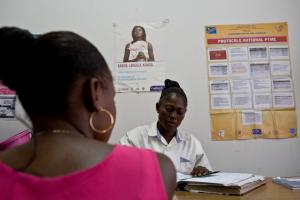Towards achieving the family planning targets in the African region: a rapid review of task sharing policies
This publication is the abstract of a scientific article, initially published in BMC Reproductive Health
Background
Expanding access and use of effective contraception is important in achieving universal access to reproductive healthcare services, especially in low- and middle-income countries (LMICs), such as those in sub-Saharan Africa (SSA). Shortage of trained healthcare providers is an important contributor to increased unmet need for contraception in SSA. The World Health Organization (WHO) recommends task sharing as an important strategy to improve access to sexual and reproductive healthcare services by addressing shortage of healthcare providers. This study explores the status, successes, challenges and impacts of the implementation of task sharing for family planning in five SSA countries. This evidence is aimed at promoting the implementation and scale-up of task sharing programmes in SSA countries by WHO.
Methodology and findings
We employed a rapid programme review (RPR) methodology to generate evidence on task sharing for family planning programmes from five SSA countries namely, Burkina Faso, Cote d’Ivoire, Ethiopia, Ghana, and Nigeria. This involved a desk review of country task sharing policy documents, implementation plans and guidelines, annual sexual and reproductive health programme reports, WHO regional meeting reports on task sharing for family planning; and information from key informants on country background, intervention packages, impact, enablers, challenges and ways forward on task sharing for family planning. The findings indicate mainly the involvement of community health workers, midwives and nurses in the task sharing programmes with training in provision of contraceptive pills and long-acting reversible contraceptives (LARC). Results indicate an increase in family planning indicators during the task shifting implementation period. For instance, injectable contraceptive use increased more than threefold within six months in Burkina Faso; contraceptive prevalence rate doubled with declines in total fertility and unmet need for contraception in Ethiopia; and uptake of LARC increased in Ghana and Nigeria. Some barriers to successful implementation include poor retention of lower cadre providers, inadequate documentation, and poor data systems.
Conclusions
Task sharing plays a role in increasing contraceptive uptake and holds promise in promoting universal access to family planning in the SSA region. Evidence from this RPR is helpful in elaborating country policies and scale-up of task sharing for family planning programmes.
Medical Officer
Sexual and Reproductive Health
Email: ouedraogol [at] who.int
Tel: +242 06 671 28 28
Team Lead
Reproductive and Maternal Health
WHO Regional Office for Africa
Email : nkurunzizat [at] who.int
Technical Officer,
Sexual and Reproductive Health and Rights
WHO Regional Office for Africa, IST for West and Central Africa
Email : asmanic [at] who.int
Technical Officer,
Sexual and Reproductive Health and Rights
WHO Regional Office for Africa, IST for East and Southern Africa
Tel. +47 241 38407
Email: elaminha [at] who.int



